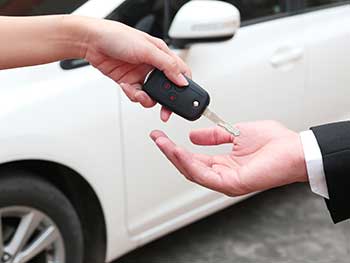Oh, No! A Car Rental Accident!
 Your vacation is going well, and then the unforeseen happens: you get in a fender-bender that’s not your fault. What happens next when you have an accident while driving a rental car? It largely depends on what kind of insurance you have.
Your vacation is going well, and then the unforeseen happens: you get in a fender-bender that’s not your fault. What happens next when you have an accident while driving a rental car? It largely depends on what kind of insurance you have.
A car crash is distressing enough when it’s your own car. A rental car accident can open a real can of worms.
You Are Responsible
Whatever happens, the bottom line is: you are responsible. Unless you purchased the insurance offered by the car rental company, you are on the hook for damages, regardless of whether the accident was your fault or not. The rental company is going to demand remuneration.
Make no mistake; the car rental business is huge—more than $27 billion in US revenue for all car rental agencies. A lot of money is on the line for the company when a car is damaged and can’t be rented out until it is repaired. And they insist you pay.
Take the Insurance, or Not?
Perhaps you’ve always been the person who turns down the “insurance” (technically, it’s not insurance) offered by the rental company. We are not going to tell you what you should do—it is a personal financial decision. But you should know before you reach the rental car counter what your potential liability is, and what your decision will be.
Be aware of what your own car insurance covers. A lot of personal car insurance policies cover rentals, but some do not. Also, if you do not own a car, you don’t have any fallback insurance, unless you carry a credit card that gives you primary coverage. (Primary coverage of rental car accidents means it generally pays. Secondary coverage pays anything left after primary coverage pays—if you’re fortunate.) If you don’t own a car, it might make sense to take the expensive rental car coverage to avoid being on the hook for the full loss of the vehicle in case of an accident.
The kinds of insurance available to you from the rental car company are:
- Collision Damage Waiver (CDW). This can also be known as the Loss Damage Waiver (LDW), or it can be offered separately as its own kind of insurance. CDW covers damage while moving (like a collision); LDW covers other damage (like vandalism).
- Supplemental Liability Protection (SLP). This can also be known as Supplemental Liability Insurance (SLI). It covers personal liability for property damage or bodily injury to others.
- Personal Accident Insurance (PAI) takes care of medical costs and death benefits.
- Personal Effects Coverage (PEC) insures against damage or loss of your personal belongings inside the rental car.
What Should I Do If I Have an Accident While Driving a Rental Car?
The basics are the same as if you had crashed your own car: call the police, get medical care for anyone who is injured, locate witnesses, trade information with the other party/parties, move vehicles out of the path of traffic if possible, take photos of the scene and the cars, and so on.
When it comes to the rental vehicle’s damage, the insurance you have will determine how much and what kind of payments you will need to make to satisfy the rental car company. It’s important to keep in mind that your coverage could be declared null and void if you broke the conditions of your rental agreement or if you broke laws while driving.
Some examples of situations when your rental car coverage could be voided include:
- Negligent or reckless driving
- Impaired (drunk/drugged) driving
- Driving in a state where you are not authorized to take the vehicle
- Unpaved road driving
- An unauthorized driver operating the rental car. You can be liable for damages even if you didn’t give them the keys, but simply left them “available” to the other person.
Be aware that the Federal Trade Commission’s decision is that if you do not purchase CDW coverage, by default you assume responsibility for all damages that occur, up to the value of the car.
The Car Rental Company Says You Damaged the Car, But You Didn’t
It happens, either from an administrative mistake or because an employee is unscrupulous: the claim is that you brought the car back damaged when nothing in actuality happened to it. It occurs more often than you might think. What can you do to prevent this?
Perhaps the most important thing you can do is to use your cell phone to take photos of the car’s condition before you leave the lot. Having an employee document and sign off on any damage the car may already have before you leave the lot is a good idea. When you return to the rental lot, if you can, take photos of the vehicle again, proving that the condition remained the same. It’s also good to again have an employee document and sign that you returned the car in the same condition as when you took it. It can take a while for a damage claim to appear, so keep all your paperwork and photos for at least six months. A year would be safer still.
You might also consider declining a car offered to you if it already has damage, is dirty, or otherwise doesn’t seem to have been taken care of. The car rental company might come after you for damage done by someone before or after you.
When Is the Rental Car Company Liable?
On June 1, 2016, a new federal law went into effect regarding safety defects in rental vehicles. The law requires any rental car company with a fleet of more than 35 vehicles to repair all safety defects before renting out the cars. Also, the National Highway Traffic Safety Administration now has the power to investigate and punish rental car companies that do not comply with recalls and requirements to have defects fixed. Because of this fact, if an improperly-maintained rental car is involved in an accident, it’s possible that the rental car company could be held responsible if an unrepaired safety defect was a factor.
Got Any Other Tips for Me?
One final item: when signing the rental agreement, find the arbitration clause and turn it down if possible and in writing. You do not want to agree to private, binding arbitration should there be a dispute. Some rental car companies will allow you to refuse to agree to arbitration as long as you notify them within 30 days after renting the vehicle. If you have any concerns about this process, an experienced personal injury attorney may be able to provide assistance.

Attorney Steve Heisler
Steve Heisler decided in 1996 that he was going to focus his law practice exclusively on injury cases. Since then, he has been representing injured people against insurance companies, disreputable medical practitioners and Big Pharma, and doing it with compassion, honesty and level-headed rationality. [ Attorney Bio ]


